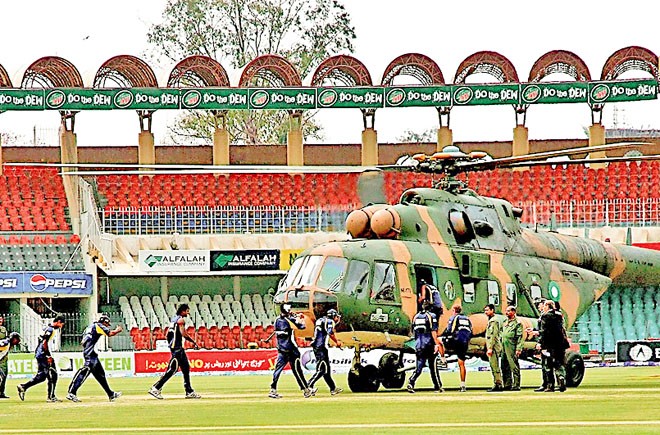
Pakistan looks as far away as ever from hosting international matches on home soil

Seven years on from the terror attack that plunged Pakistan into sporting isolation, the cricket-mad country looks as far away as ever from hosting international matches on home soil.
Pakistan’s status as an international sporting venue came under doubt after terrorists attacked the bus carrying Sri Lankan cricketers to the Gaddafi stadium Lahore in March 2009.
Five cricketers, including Mahela Jayawardene and Kumar Sangakkara, received minor injuries. Ajantha Mendis, Thilan Samaraweera and Tharanga Paravitarana were also injured in the attack which killed six security men and two civilians. Terror attacks have happened in America and Europe as well. But no team or player refused to play in these countries.
Some of the English players were unwilling to return for the Test series in India after the Mumbai terror attack in 2008, but the BCCI officials requested England team to come back to India for the Test series, saying that otherwise terrorism would win.
Indian media and former cricketers argued that England should play in India and not allow the terrorists to succeed in spreading fear, despite reports that terrorists were attacking mainly British and American citizens.
But when the Indian government chose not to send the team to Pakistan these same players supported the government. The players included Kapil Dev, Dilip Vengsarkar, Ajit Wadekar, Aunshuman Gaekwad, Anil Kumble and Sourav Ganguly.
In 1991, Shiv Sena’s men damaged the Wankhede Stadium’s pitch two days before Pakistan’s ODI series in India. Both times India requested Pakistan to continue their tour and on both occasions when militants directly threatened the Pakistan cricket team they not only continued their tour but did not even ask to change the venues.
In 1999 again when Pakistan was touring India, Hindu militants opposed Pakistan tour to India and dug up Delhi’s Feroz Shah Kotla Stadium pitch.
In 1998 on the tour of South Africa, Pakistan’s Saqlain Mushtaq and Mohammad Akram were mugged near their hotel in Sandton. Saqlain and Akram were crossing the road outside the hotel to eat at a local Indian restaurant, when a car drew up. Two men jumped out and demanded money. As a result of this incident Saqlain needed a neck brace, while Akram was left nursing a severe gash on his bowling hand.
If Pakistan could continue their tour why are other teams hesitant to come to Pakistan?
Australia continued their tour in 2005 even after the 7/7 bomb blasts. In that incident 52 persons were killed and around 700 wounded. But the touring Australian team never asked for cancelling the tour.
The purpose of recalling these incidents is that earlier this month, a group of gunmen attacked a restaurant in the diplomatic quarter of Dhaka, killing policemen and civilians, mostly foreigners. After this England’s limited-overs captain Eoin Morgan showed his concerns about the tour to Bangladesh in October and said that neutral venues may be "feasible if it came to that".
But Bangladesh Cricket Board’s Chief Executive Nizamuddin Chowdhury categorically rejected any talk of playing England at a neutral venue. "We have a very good track record of hosting international events with support from the government and law enforcement departments," he said.
But when it’s about Pakistan not only major teams but even Bangladesh refuse to play here.
Last month in an interview, PCB chairman Shaharyar Khan said that the board itself was hesitant to host a series at home. "We do not want to take a risk," he said.
If Bangladesh board can take a strong stand and refuse to play on neutral venue against England, why does PCB fail to take a solid stand? Terrorism is not an issue in Pakistan only. It can happen and has happened in many countries.